| Introduction |
|
I’ve been experiencing some pretty extreme changes in temperature recently – in early March I was in southern Mali with temperatures around 35o C and then in the snow in Norway the next week with N2Africa colleagues for a RoundTable on Sustainable Soyabean. ...
Photo: N2Africa team at the Norwegian University of life Sciences, Ås, Oslo, in the snow. From left to right: Victor Antwi (AGRA), Ken Giller, Theresa Ampadu-Boakye, Bernard Vanlauwe, Samuel Adjei-Nsiah
|
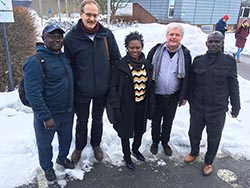 |
|
1 |
| The Sustainable Soyabean Roundtable in Oslo, Norway |
|
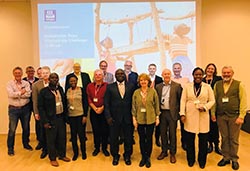
|
The Minister of Food and Agriculture of Ghana has requested N2Africa and Yara to boost soyabean production in northern Ghana as part of the “Planting for Food and Jobs” initiative. Here we report on progress.
On 5 November 2018, an N2Africa team comprising of Ken, Bernard, Theresa and Samuel and a team from Yara, comprising of Derick Tuffour, Danquah Addo-Yobo and Øystein Botillen, met at the IITA office in Accra, Ghana to discuss the possibility of forming a partnership around soyabean to continue with N2Africa project with possible funding from Norwegian government.
Photo: A roundtable discussion among a small group of invited experts and leaders, hosted by Yara International in Oslo addressed a wide range of soya related issues. Photo: Camilla Nyhuus Christensen, Yara,
|
|
2 |
| A combination of dissemination approaches to scale-up legume technologies in Tanzania |
|
In Tanzania, N2Africa and a number of related projects jointly developed and applied a range of innovative communication approaches to scale-up improved legume technologies. To assess the effectiveness of these communications approaches, N2Africa, the Centre for Agriculture and Bioscience International (CABI), Farm Radio International (FRI) and other partners designed a survey tool using Computer Aided Telephone Interviews (CATI).
Figure: N2Africa action areas-Districts 2015-2018
|
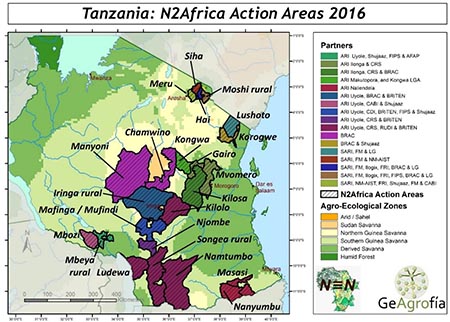
|
|
3 |
| N2Africa legacy in DRC |
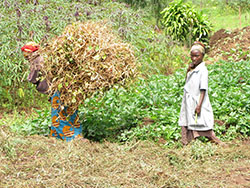 |
Update on the legacy in DRC based on three questions asked to all Tier 1 country coordinators:
- To what extent is there still a (knowledge) network around legumes and nitrogen fixation active in your country?
- To what extent are private sector and/or NGOs still selling/using/promoting “N2Africa technologies”? Can farmers readily access seeds, inoculants, legume-specific fertilizers?
- Are there any interesting new developments taking place around legumes and nitrogen fixation?
Photo: Carrying the bean harvest home
|
|
4 |
| N2Africa legacy in Kenya |
Update on the legacy in Kenya based on the three questions mentioned above asked to all Tier 1 country coordinators and a testimony of Visionary Farmers Association.
|
5 |
| N2Africa legacy in Malawi |
|
Update on the legacy in Malawi based on the three questions mentioned above asked to all Tier 1 country coordinators.
Photo: Entrance of the new AISL laboratory near completion
|
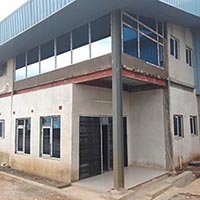
|
|
6 |
| N2Africa legacy in Mozambique |
Update on the legacy in Mozambique based on the three questions mentioned above asked to all Tier 1 country coordinators.
|
7 |
| N2Africa legacy in Rwanda |
Update on the legacy in Rwanda based on the three questions mentioned above asked to all Tier 1 country coordinators.
|
8 |
| N2Africa legacy in Zimbabwe |
Update on the legacy in Zimbabwe based on the three questions mentioned above asked to all Tier 1 country coordinators.
|
9 |
| A molecular toolkit for high-throughput identification of competitive and effective rhizobial strains |
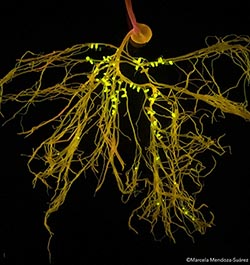 |
Despite decades of intensive research on Rhizobium-legume symbioses, we are still only beginning to understand the factors that influence the survival, persistence, efficiency and competition of rhizobial strains in various environmental conditions.
Research focused on the identification of both competitive and highly effective nitrogen-fixing strains has been limited because, so far, the only way to test competitive rhizobial strains has been to isolate individual strains and compare them one at a time in large-scale plant growth assays.
Photo: Nodules expressing green fluorescence occupied by Tagged-strains with Plasmid-IDs and non-fluorescent nodules occupied by indigenous rhizobia
|
|
10 |
| Future 50 Foods from Knorr |
|
Among other duties, Ken Giller serves as a member of the Sustainable Sourcing Advisory Board of Unilever and through this he was asked to review this report. He was delighted to do so, as he finds it an important initiative to broaden the range of crops commonly used in foods. Of course he was not surprised to see that several legumes were selected by the Knorr team and the scientists who advised them. The final report can be downloaded here and the section on Beans and Pulses starts on page 11.
|
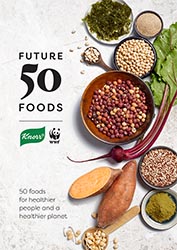 |
|
11 |
| N2Africa publications |
- Influence of P sources and rhizobium inoculation on growth and yield of soybean genotypes on Ferric Lixisols of Northern Guinea savanna zone of Ghana by Adjei-Nsiah, S., Kumah, J.F., Owusu-Bennoah, E., Kanampiu, F.;
- Response of Grain Legumes to Phosphorus Application in the Guinea Savanna Agro-Ecological Zones of Ghana by Adjei-Nsiah, S., Alabi, B.U., Ahiakpa, J.K., Kanampiu, F.;
- Current and potential role of grain legumes on protein and micronutrient adequacy of the diet of rural Ghanaian infants and young children: Using linear programming by De Jager, I., Borgonjen-Van Den Berg, K.J., Giller, K.E., Brouwer, I.D.
- Response of common bean (Phaseolus vulgaris L.) to nitrogen, phosphorus and rhizobia inoculation across variable soils in Zimbabwe, by Chekanai, V., Chikowo, R., Vanlauwe, B.
|
12 |
| Report uploaded on the N2Africa website |
Climbing bean x highland banana intercropping in the Ugandan highlands by Esther Ronner, Eva Thuijsman, Peter Ebanyat and Ken Giller
|
13 |
| Related newsletters |
ASHC news report: How data visualization helps to plan and evaluate the campaign approach;
ASHC blogs: Nigeria soybean campaign reaches 170,000 famers… and shares key lessons on impacts of the uptake of campaign messages and
Gala blogs: CABI and IFDC join forces to get soybean film out to farmers in Northern Ghana and Soybean Innovation Lab and CABI explore a stepwise investment approach using technology bundles and Village-based film screenings prove a popular way to reach and inform farming families in Northern Ghana;
Soybean Innovation Lab: Newsletter December 2018;
SeedSystems blogs: Experience of farmers in adopting production and use of quality declared seed (QDS) in Uganda and How do we scale last mile bean service? Trucks versus AgroVet shops in Tanzania;
IITA News: Youth Agripreneur insists beans can be preserved naturally without using Sniper.
|
14 |
| Announcements |
The 21st International Conference on Nitrogen Fixation (ICNF 2019) will be held on October 10-15, 2019, on the campus of Huazhong Agricultural University, Wuhan, China. ...
Feed the Future Innovation Lab for Legume Systems Research Announces Request for Concept Notes: Area of Inquiry 1
The Legume Systems Innovation Lab will be funding projects in the following three Areas of Inquiry (AOI): ...
|
15 |








